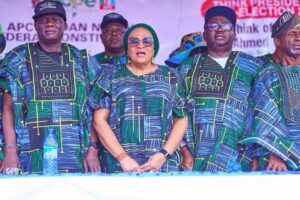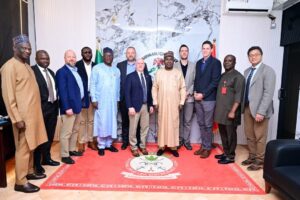The Federal Government has intensified reforms in the power sector aimed at delivering stable and reliable electricity supply to industrial clusters and households nationwide.
Minister of Power, Adebayo Adelabu, disclosed this at the 31st Nigerian Economic Summit in Abuja, where he reaffirmed the government’s commitment to building a sustainable power industry to drive national productivity and economic growth.
Adelabu said the ongoing reforms, under President Bola Tinubu’s Renewed Hope Agenda, are anchored on investment, policy coherence, and accountability across the entire electricity value chain.
He noted that the summit, themed “Uninterrupted Power: The Industrial Imperative,” provided a timely platform for stakeholders to identify practical pathways towards achieving energy reliability.
According to him, the government is prioritising strategic investment in infrastructure to ensure predictable power delivery, particularly to commercial and industrial customers willing to pay for quality supply.
He cited the Light Up Nigeria Project, spearheaded by Vice President Kashim Shettima, as a flagship initiative providing stable electricity to industrial hubs, with operations already launched in Agbara, Lagos, and Enugu State.
Adelabu also referenced successful private-led models such as the partnership between Konexa and Nigerian Breweries in Kaduna State, noting that similar arrangements would be replicated across other zones.
On tariff reform, the Minister said the introduction of cost-reflective tariffs for select consumers has improved market liquidity, enhanced reliability, and boosted revenues by 70 per cent to ₦1.7 trillion in 2024, with projections exceeding ₦2 trillion in 2025.
He added that President Tinubu has approved a ₦4 trillion bond to clear verified debts owed to generation companies and gas suppliers, while a targeted subsidy framework is being developed to protect vulnerable households.
Adelabu announced that under Phase Zero of the Presidential Power Initiative, transmission capacity has increased by over 700MW, while Phase One—already contracted with Siemens Energy and others—will add 7,000MW of operational capacity.
He said Nigeria’s average power generation rose to 5,300MW in 2024 from 4,200MW in 2023, boosted by the rehabilitation of Niger Delta Power Plants and integration of the 700MW Zungeru Hydropower Plant.
To close the national metering gap, the Presidential Metering Initiative aims to deploy 1.1 million meters by 2025 and two million annually for five years, supported by ₦700 billion from FAAC and 3.2 million additional meters from the World Bank’s DISREP programme.
The Minister further revealed that over $2 billion has been mobilised through key interventions— including the World Bank’s DARES Programme, NSIA’s RIPLE Platform, and Japan’s JICA Fund— to expand renewable energy access nationwide.
Adelabu highlighted ongoing capacity-building efforts, including new training facilities at the National Power Training Institute of Nigeria (NAPTIN) and a partnership between the Rural Electrification Agency and Oando Clean Energy for a 1.2GW solar project with an integrated recycling plant.
He urged participants at the summit to propose evidence-based recommendations to unlock investment across the value chain and strengthen collaboration among government tiers and the private sector.
Reaffirming the government’s resolve, Adelabu said the ultimate goal is to build a sustainable, efficient, and globally competitive power industry under President Tinubu’s Renewed Hope vision.





